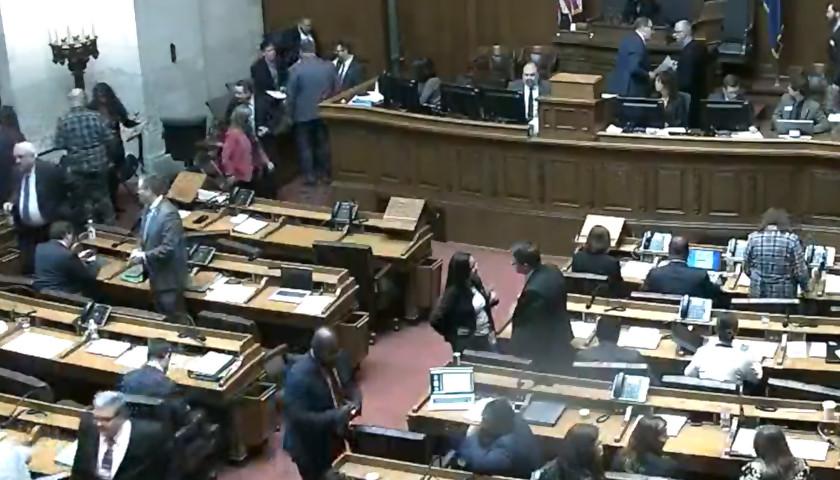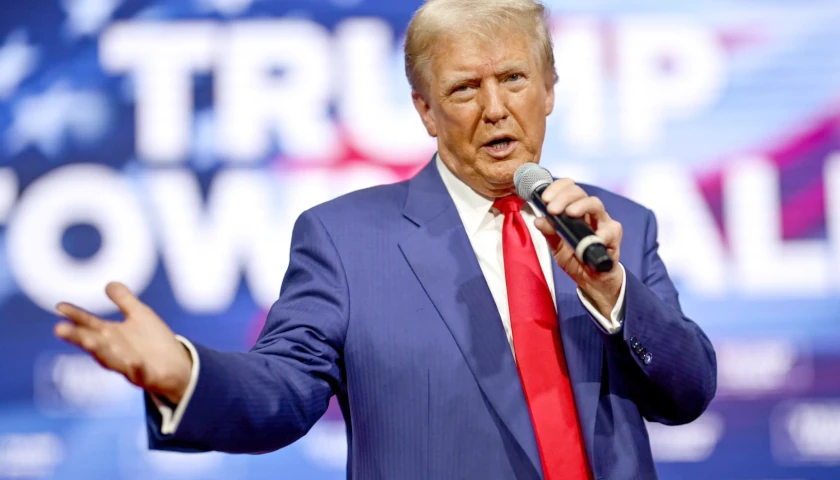In a busy and divisive day, the Republican-led Legislature on Wednesday passed several crime bills, a measure blocking what some say is the Evers administration’s assault on the First Amendment, and a resolution demanding the governor call an election for Secretary of State.
Many of the measures passed mostly along party lines, including a bill that defines “serious harm” and “violent crime” in state law. The proposal is tied to a bail reform constitutional amendment on next month’s spring election ballot. Under the amendment, judges would be allowed to consider expanded factors when issuing bail to violent offenders, beyond whether the defendant would show up for his court date.
Senate Bill 75, defines “serious harm” as, among other things, “personal physical pain or injury,” as well as “damage to property over $2,500” and “economic loss over $2,500 in value.” The current statute just references “serious bodily harm.” The amendment calls for serious harm to be defined in law and to “harmonize” the statutes with the amendment.
Assembly Republicans were joined by just three Democrats in passing the legislation, which the Senate previously approved. The bill is now headed for Democrat Governor Tony Evers’ desk.
“Passing this legislation is important for voters to understand what specifically would be law under the constitutional amendment that is on the ballot in April,” said State Rep. Mark Born (R-Beaver Dam). “These law changes, paired with the constitutional amendment, would give judges more tools to evaluate public safety risks when setting conditions for bail.”
The Assembly also passed bills stiffening penalties for reckless driving. All but 12 Democrats joined Republicans in passing the bill, which Evers has said he will sign.
In the Senate, the Republican majority moved to block the Evers administration’s proposed rule that would ban so-called conversation therapy. Democrats railed against mental health counseling practices designed to change an individual’s sexual orientation or gender identity. They insist such therapy has been discredited by mental health professionals and that it is an assault on the LGBTQ+ community.
“I have to say that today, I am embarrassed to be a member of the state Senate, and I don’t say that often,” said State Senator Tim Carpenter (D-Milwaukee), an openly gay member of the Senate, during floor debate.
Forgotten in the left’s rhetoric, however, is that the Evers administration attempted to penalize licensed practitioners and, critics say, gut free speech through its rule. Therapists engaged in anything deemed to be conversion therapy by the government could be charged with committing malpractice.
Opponents of the rule said the language was vague and an unconditional permission of governmental regulation of speech.
“There is no other area of professional counseling that prohibits a counselor from utilizing interventions to explore consequences of choices,” Lee Webster, a private-practice, state-certified therapist for nearly a half century, wrote in opposition to the Wisconsin Department of Safety and Public Standards rule.
As National Review reported, Webster’s Center for Human Development in Wausau is centered on the Christian faith. It has a cross in its logo. It’s mission statement talks about applying faith-based principles. Its website notes its support for “traditional values” and that it networks with churches to provide faith-based programs “to strengthen marriage, family, and Church life.” But Webster said their work is not limited to Christian clients, and he does not try to convert people to accept his beliefs.
In his letter to lawmakers, Webster said the rule “negates the very definition of counseling.”
The Senate and the Assembly on party lines passed a resolution asking Evers to call a special election for Secretary of State after he quickly appointed former state Treasurer and Democratic Party politics climber Sarah Godlewski to fill position.
Last week, Democrat Doug La Follette stepped down. The octogenarian, who had served as Secretary of State for more than 40 years, narrowly won another four-year term in November.
Republicans cried foul, asserting Evers named Godlewski to the post as a reward for backing out of the race for the Democratic Party’s nomination for U.S. Senate, clearing the path for Evers’ former Lt. Governor Mandela Barnes just days before the August primary. Barnes eventually lost to U.S. Sen. Ron Johnson, a Republican, in the November general election.
State law offers Evers the choice of appointing a successor to the office or ordering a special election. The highly partisan liberal chose to keep the statewide office in Democratic Party hands.
“The resolution the Senate passed today sends a clear message to Governor Evers: the people of Wisconsin should have an opportunity to vote to elect their Secretary of State,” said Senate Majority Leader Devin LeMahieu (R-Oostburg). “Instead of appointing an interim Secretary and calling a special election, Governor Evers has decided to subvert Wisconsin’s democracy to reward a political ally.”
Republicans pointed to the hypocrisy of Evers and his fellow Democrats for demanding referenda on Wisconsin’s abortion ban and legalization of marijuana, but the governor won’t let voters decide who runs the Secretary of State’s office.
Far left Senator Kelda Roys (D-Madison) said it’s just sour grapes from Republicans, acknowledging the shortcoming of La Follette, who seemed less than excited about running for another term.
“The reason the Democrats won the election again in November is not because Doug was such a great candidate. It’s because voters want to keep Republicans the hell away from that office,” Roys said.
Secretary of State is for the most part a do-nothing office, anyway. Its role has been drastically diminished over the years through government reforms and streamlining.
Still, Republicans say the people, not the governor, should decide.
“Calling for a special election would reassure Wisconsinites that elections, not cronyism, decide who represents them in Madison,” LeMahieu said.
– – –
M.D. Kittle is the National Political Editor for The Star News Network.
Image “Wisconsin General Assemble Floor Session” by WisEye.





